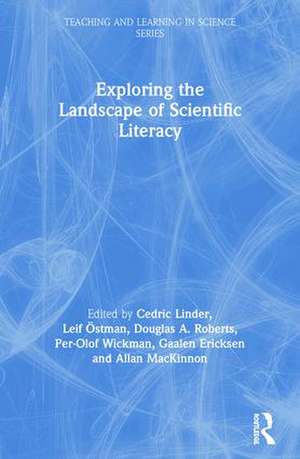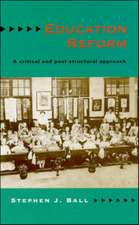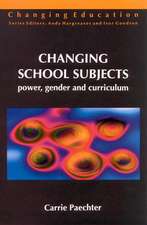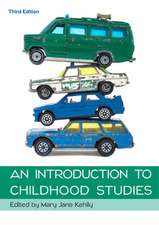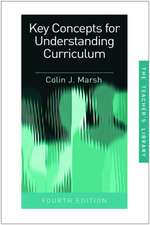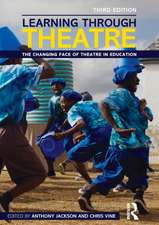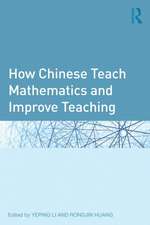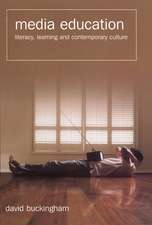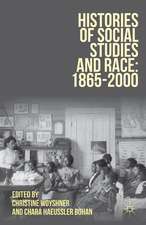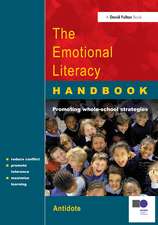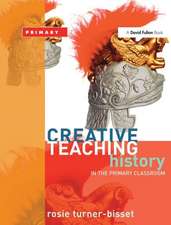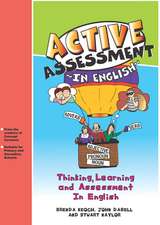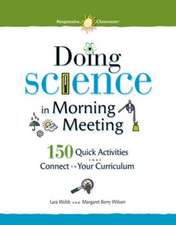Exploring the Landscape of Scientific Literacy: Teaching and Learning in Science Series
Editat de Cedric Linder, Leif Östman, Douglas A. Roberts, Per-Olof Wickman, Gaalen Ericksen, Allan MacKinnonen Limba Engleză Paperback – 8 sep 2010
| Toate formatele și edițiile | Preț | Express |
|---|---|---|
| Paperback (1) | 488.03 lei 6-8 săpt. | |
| Taylor & Francis – 8 sep 2010 | 488.03 lei 6-8 săpt. | |
| Hardback (1) | 1064.70 lei 6-8 săpt. | |
| Taylor & Francis – 8 sep 2010 | 1064.70 lei 6-8 săpt. |
Din seria Teaching and Learning in Science Series
-
 Preț: 312.86 lei
Preț: 312.86 lei -
 Preț: 394.02 lei
Preț: 394.02 lei -
 Preț: 379.75 lei
Preț: 379.75 lei -
 Preț: 437.71 lei
Preț: 437.71 lei -
 Preț: 475.06 lei
Preț: 475.06 lei -
 Preț: 452.75 lei
Preț: 452.75 lei -
 Preț: 337.83 lei
Preț: 337.83 lei -
 Preț: 396.95 lei
Preț: 396.95 lei -
 Preț: 451.94 lei
Preț: 451.94 lei -
 Preț: 396.14 lei
Preț: 396.14 lei -
 Preț: 388.42 lei
Preț: 388.42 lei -
 Preț: 389.38 lei
Preț: 389.38 lei -
 Preț: 408.79 lei
Preț: 408.79 lei -
 Preț: 376.10 lei
Preț: 376.10 lei - 9%
 Preț: 804.95 lei
Preț: 804.95 lei -
 Preț: 308.97 lei
Preț: 308.97 lei -
 Preț: 387.49 lei
Preț: 387.49 lei -
 Preț: 476.88 lei
Preț: 476.88 lei -
 Preț: 333.09 lei
Preț: 333.09 lei
Preț: 488.03 lei
Nou
Puncte Express: 732
Preț estimativ în valută:
93.38€ • 97.50$ • 77.29£
93.38€ • 97.50$ • 77.29£
Carte tipărită la comandă
Livrare economică 05-19 aprilie
Preluare comenzi: 021 569.72.76
Specificații
ISBN-13: 9780415874366
ISBN-10: 041587436X
Pagini: 312
Ilustrații: 10 black & white tables, 1 black & white halftones, 14 black & white line drawings
Dimensiuni: 152 x 229 x 20 mm
Greutate: 0.43 kg
Ediția:New.
Editura: Taylor & Francis
Colecția Routledge
Seria Teaching and Learning in Science Series
Locul publicării:Oxford, United Kingdom
ISBN-10: 041587436X
Pagini: 312
Ilustrații: 10 black & white tables, 1 black & white halftones, 14 black & white line drawings
Dimensiuni: 152 x 229 x 20 mm
Greutate: 0.43 kg
Ediția:New.
Editura: Taylor & Francis
Colecția Routledge
Seria Teaching and Learning in Science Series
Locul publicării:Oxford, United Kingdom
Public țintă
Postgraduate and UndergraduateCuprins
1. Overview: Scientific Literacy and the State of the Art in School Science Education Part I: Curriculum Policy and Scientific Literacy Introduction 2. Competing Visions of Scientific Literacy: Influence of a Science Curriculum Policy Image 3. Scientific Literacy for a Knowledge Society 4. Scientific Literacy: Content and Curriculum Making Part II: Exploring Language Perspectives Introduction 5. Scientific Literacy, Discourse, and Epistemic Practices 6. Scientific Literacy and Students’ Movability in Science Texts 7. Literacy as Metaphor and Perspective in Science Education 8. Bilingual Scientific Literacy Part III: Exploring Themes of Scientific Literacy Introduction 9. The Development of Scientific Literacy 10. Scientific Literacy as Action 11. What Do Values and Norms Have to Do with Scientific Literacy? 12. An Inclusive View of Scientific Literacy 13. Scientific Literacy for Bringing in the Outsiders Part IV: Science Teachers' Professional Development 14. In the Path of Linnaeus 15. The Vietnam Consortium Fellowship Program 16. Making an Innovation Grow 17. Professional Development of Teachers and Researchers in a Collaborative Development of Teaching Resources 18. Struggling Up Mount Improbable
Notă biografică
Cedric Linder is Professor of Physics Education Research, Uppsala University, Sweden, and Professor of Physics, University of the Western Cape, South Africa.
Leif Östman is Professor in Curriculum Studies and Director of the Institute for Research in Education and Sustainable Development, Uppsala University, Sweden.
Douglas A. Roberts is Professor Emeritus of Education, University of Calgary, Canada.
Per-Olof Wickman is Professor and Director of Science Education, Stockholm University, Sweden.
Gaalen Erickson is Professor, Department of Curriculum Studies, University of British Columbia, Canada.
Allan MacKinnon is Associate Professor, Faculty of Education, Simon Fraser University, Canada.
Leif Östman is Professor in Curriculum Studies and Director of the Institute for Research in Education and Sustainable Development, Uppsala University, Sweden.
Douglas A. Roberts is Professor Emeritus of Education, University of Calgary, Canada.
Per-Olof Wickman is Professor and Director of Science Education, Stockholm University, Sweden.
Gaalen Erickson is Professor, Department of Curriculum Studies, University of British Columbia, Canada.
Allan MacKinnon is Associate Professor, Faculty of Education, Simon Fraser University, Canada.
Descriere
Offering new ways to look at the key ideas and practices associated with promoting scientific literacy, this book takes a pragmatic and inclusive perspective on curriculum reform and learning and presents a future vision for science education research and practice.
